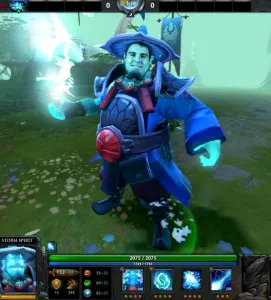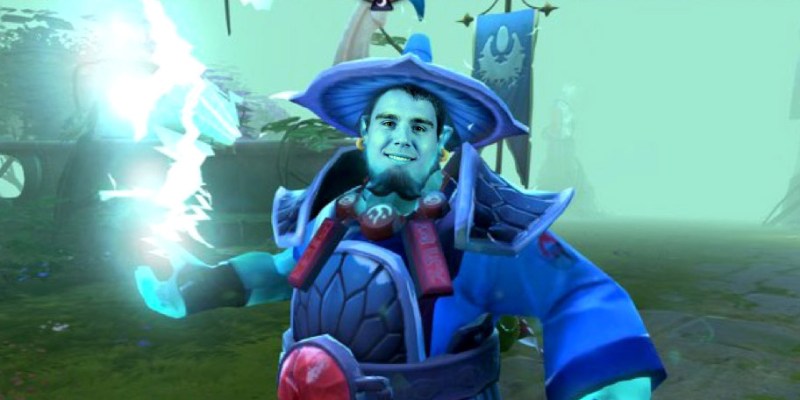Remember how the majority of the sports world collectively crapped its pants when ESPN inexplicably decided to air the finals of an eSports competition (“Heroes of the Dorm”), of all things, on primetime television?
“What, exactly, does 12 skinny virgins guys sitting at a table furiously clicking mice have to do with feats of otherworldly athleticism from some of the most skilled men and women in the world? How could ESPN possibly think that those two activities even belong in the same universe?”

As your resident Korean, I’m deeply ashamed to say that I have no idea how to answer that question; I’m woefully illiterate in the realm of eSports, even though it’s unofficially the official national sport of South Korea.
Fortunately for you, I’m not going to be the one taking you through the world of eSports — I have Blake Martinez to do that for me.
Yeah, that Blake Martinez who made the All-Pac-12 First Team at inside linebacker and led the Pac-12 in tackles by a wide margin. The Blake Martinez who ate the Pac-12’s best running backs for lunch on Saturdays and is projected to be taken in the mid to late rounds of the 2016 NFL Draft this weekend.
The Blake Martinez who is, apparently, also a huge gaming nerd.
You’re forgiven if you can’t help but chuckle at the idea of the 6-foot-2, 245-pound team captain huddled over the popular multiplayer online game Dota 2 on a computer screen in a dark room instead of going out and making regrettable life decisions, like any other god-fearing star athlete would.
He thinks it’s pretty funny, too, and the hilarity of the weird juxtaposition of a man of his stature among the decidedly smaller, less athletic (to say the least) members of the gaming community isn’t lost on him, either.
“We went to [a tournament] in San Francisco, and we were the biggest guys there,” Martinez said. “It was me and [fellow inside linebacker] Craig [Jones]. We were just walking around and were like, ‘Hmm. I think we can do anything here, because nobody’s going to mess with us.’
“There’d be pictures being taken, and we’d just walk to the front and be like, ‘All right, picture!’ and walk away.”
Dota 2 is a massive multiplayer online game played by around 4 million unique people every month in which players take control of a “hero,” one of many powerful characters with unique powers, ranging from “Brewmaster” (a “melee strength hero” according to Dota 2 Wikipedia that looks like some sort of anthropomorphic cat-thing) to “Ogre Magi” (which is, quite literally, a two-headed blue ogre with tusks that is described as a “powerful ganker”).
The game is played in teams of five, and each of the teams has to be strategically built so that the heroes that make up the team complement each other with their unique abilities and skills. At the most basic level, each hero takes on a distinct role on the team and the five players on a team have to leverage each other’s roles in “farming” gold, fighting and other such pursuits to destroy the other team, or something like that. I don’t know — Blake can explain it better than I can.
“You have five guys on a team, and you have one objective: To destroy this base,” Martinez said. “It’s all working together. You have to have teamwork, have one person calling the shots and making sure that everyone’s doing what they’re doing.”
As with all of the most nerdy pursuits on the Stanford football team, it all started with kicker Conrad Ukropina, who invaded Martinez’s suite one day and tried to peer pressure a decidedly uninterested Martinez into playing the game with him.
“I was like, ‘No, there’s no way. I’m not doing that. I’m fine,’” Martinez recalls. “I used to play a lot of video games in high school and stuff but I just stuck to Madden and the sorts of things like that.”
Jones, who plays alongside Martinez at inside linebacker and has roomed with Martinez for the last few years, was all for following Ukropina’s lead and getting involved in the Dota scene. To try and coax the very stubborn Martinez into playing as well, Jones went as far as to make Martinez his own account.
“I was like, ‘Okay, sure, whatever,’” Martinez says.
It didn’t take long for his resolve to break.
“I started watching them play and I was like, ‘Oh, this looks kind of cool. I’m going to dive in and start playing.’
“Next thing I know, six hours went by and I was like, ‘Whoops!’”
He was hooked immediately, and he’s not ashamed to admit it. Martinez says that during the football offseason, he’d try to get in one game before bedtime every night. He has a favorite hero. (“Storm Sprit. He’s their mid-hero and he can let them zip across the map, so once you get enough items, you can zip halfway across the map and just kill a hero.”) He has a favorite professional team, “Evil Geniuses,” often abbreviated as “EG.” (“The only USA team, I think, that’s, like, decent.”)
Though his Dota 2 activity goes down significantly during football seasons, he still likes to play it occasionally in-season as a way to get away from both football and school. And part of the appeal to him is that, contrary to popular opinion, Dota harnesses the same competitive nature in him that comes out during football games — and he’s able to express that leadership and thirst for action in a different setting from the gridiron.
“I kind of related it to — I guess it’s more like basketball 5 v. 5 — with football, you have certain plays, certain things that you want to set up and do with your set of heroes, you have to select certain heroes that match up with each other and collectively coexist throughout your play,” he explains.
“I’m the guy that wants to be the playmaker, so I’m like the farm guy, the mid-player, which is the take-over-the-game type of thing — that’s me. Obviously I make sure everyone else does the supporting stuff and make sure I know where to go.”
And when he puts it like that, Martinez really does make Dota 2 sound similar to a “real sport” — you have teams, with individual players that have specialized roles, that train together and compete together in games of both strategy and technique. You have matchup problems that you have to plan around, you have captains that dictate the strategy, you have professional leagues. All that’s missing is the physical action — and that’s something that, say, professional poker also lacks, and I can’t remember there ever having been such a strong backlash over ESPN’s airing of late-night poker.
It’s only the connotation and the stigma that gaming carries in our society that has stopped eSports such as Dota 2 from being accepted into society’s mainstream alongside athletic sports, and ESPN has started to realize that there’s a large market to be tapped into by integrating eSports coverage. Consider, for example, the fact that the finals of The International (“TI”) 5, a major Dota 2 tournament, drew an estimated 4.5 million viewers, compared to the 7.6 million that tuned in to watch the Blackhawks clinch the Stanley Cup last year.
Although it’s certainly easier to get acceptance as a “gamer” on a more “nerdy” campus like Stanford, Martinez doesn’t seem to worry at all about the connotation that playing Dota might give him, much like fearsome linebacker Shayne Skov before him, who was equally unabashed in his love for video games.
“I feel like everyone has their different niche that they like to do when they step away from football,” Martinez says.
Two Christmases ago, he asked his parents to get him a new gaming mouse to optimize his clicking and got a brand-new gaming setup rivaling that of Jones, who also received a dual-monitor setup with a gaming desktop from his dad.
Whichever city Martinez ends up in next season while he plays on Sundays, his gaming setup is sure to follow — and if you’re one of the people who still pokes fun at eSports, make sure you don’t say it to his face. He is an athlete, after all.
Contact Do-Hyoung Park at dhpark ‘at’ stanford.edu.
